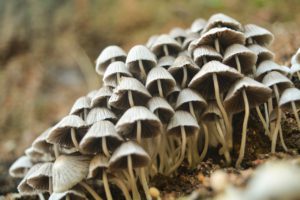Gardening enthusiasts are always looking for ways to enhance the fertility and health of their garden soil. One particularly effective and sustainable method gaining popularity is mushroom compost. This organic material, derived from the byproducts of mushroom farming, offers many benefits that can transform ordinary soil into a nutrient-rich powerhouse for plant growth.
What is Mushroom Compost?
Mushroom compost, also known as mushroom soil or mushroom substrate, is a blend of various organic materials used as a growing medium for mushrooms. These materials typically include straw, hay, corn cobs, poultry litter, gypsum, and other agricultural byproducts. As mushrooms grow, they break down these organic components, resulting in a nutrient-rich compost teeming with beneficial microorganisms.
Nutrient-Rich Composition
One of mushroom compost’s primary benefits is its nutrient-rich composition. As the organic materials decompose during the mushroom growing process, they release essential nutrients such as nitrogen, phosphorus, potassium, calcium, and magnesium into the compost. These nutrients are vital for plant growth and development, promoting robust root systems, lush foliage, and abundant blooms.
Improved Soil Structure
In addition to its nutrient content, mushroom compost also helps improve garden soil structure. Its organic matter acts as a soil conditioner, loosening compacted soil and improving aeration and drainage. This enhanced soil structure creates an optimal environment for root growth, allowing plants to access water, nutrients, and oxygen more efficiently.
Retention of Moisture
Mushroom compost has excellent moisture-retention properties, helping to keep soil evenly moist for extended periods. This is especially beneficial during hot, dry weather when plants are prone to drought stress. By retaining moisture in the soil, mushroom compost helps reduce the frequency of watering, conserving water and reducing water-related stress on plants.
Suppression of Weeds and Diseases
Another advantage of using mushroom compost in the garden is its ability to suppress weeds and diseases. The organic matter in the compost creates a physical barrier that inhibits weed germination and growth, reducing the need for manual weeding. Additionally, the beneficial microorganisms present in mushroom compost can help suppress harmful pathogens, minimizing the risk of soil-borne diseases affecting your plants.

Environmental Sustainability
Mushroom compost is a sustainable gardening practice that utilizes agricultural waste products that would otherwise be discarded. By recycling these materials into compost, mushroom farming contributes to waste reduction and environmental conservation efforts. Furthermore, using organic composts like mushroom compost promotes soil health and biodiversity, supporting a balanced ecosystem in the garden.
How to Use Mushroom Compost in Your Garden Soil
Incorporating mushroom compost into your garden soil is straightforward. Begin by evenly spreading a layer of compost over the soil surface, typically around 2-3 inches thick. Then, use a garden fork or tiller to incorporate the compost into the top few inches of soil. Water the area thoroughly to help activate the compost and distribute nutrients throughout the soil.
Application in Various Garden Settings
Mushroom compost is versatile and can be used in various garden settings, including vegetable gardens, flower beds, and container gardening. Whether growing tomatoes, roses, or herbs, incorporating mushroom compost into the soil can provide a nutrient boost that supports healthy growth and bountiful yields. Mixing mushroom compost with potting soil in container gardening can improve soil quality and create an optimal environment for potted plants to thrive.
Considerations for Effective Use
While mushroom compost offers numerous benefits, it’s essential to use it effectively to maximize its potential. Avoid applying thick layers of compost, as excessive amounts can lead to nutrient imbalances and waterlogging. Instead, aim for a thin, even layer easily incorporated into the soil. Additionally, it’s advisable to allow mushroom compost to mature for several weeks before planting, as fresh compost may contain high levels of ammonia that can harm young plants.
Long-Term Benefits for Soil Health
In the long term, mushroom compost can contribute to improved soil health and sustainability. By enriching the soil with organic matter and beneficial microorganisms, mushroom compost fosters a healthy soil ecosystem that supports plant growth and resilience. Over time, this leads to increased soil fertility, enhanced water retention, and reduced reliance on synthetic fertilizers and pesticides. Ultimately, integrating mushroom compost into your gardening practices can lead to healthier plants, higher yields, and a more sustainable garden environment for years to come.
